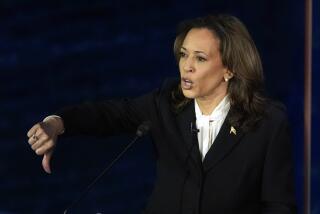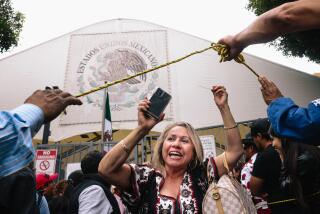Poles in U.S. Take Part in Historic Voting : Election: From L.A. to Chicago, thousands of emigres cast absentee ballots.
- Share via
CHICAGO — Just weeks after U.S. elections in which apathy seemed the big winner, Poles eagerly flocked to voting booths Saturday in several American cities to cast absentee ballots in the first free Polish presidential election since World War II.
Many of the voters seemed so proud to participate that they took turns snapping photographs of each other as they dropped their paper voting slips into ballot boxes.
“We’re hoping for a better future,” said 19-year-old Peter Michalski after voting at the Polish Consulate here, a place few Polish emigres dared enter before the downfall of the Communist government last year. “It’s a chance we didn’t have for over 60 years.”
Consular officials in Chicago, who also organized the voting centers in Detroit, Milwaukee, St. Louis and Los Angeles, predicted that as many as 40,000 Polish citizens--about half of them in Chicago--would cast votes for one of the six presidential contenders on the ballot. They include front-runners Lech Walesa, founder of the non-Communist Solidarity trade union, and Tadeusz Mazowiecki, the current Polish prime minister and a one-time Solidarity ally of Walesa.
In Los Angeles, election officials expected about 1,500 voters, including some from out of state, to cast ballots, based on pre-registrations.
With little experience in conducting elections, the consulate in Chicago borrowed voting booths and other materials from the city’s Board of Elections. Still, Robert Michniewicz, the Polish vice consul, said that the booths were the only electoral legacy that would be borrowed from the city. “I don’t think there will be any tricks even though we’re in Chicago,” Michniewicz pledged.
Rules were fairly simple. To be eligible, voters needed only to prove that they were 18 years old and to provide either documentary evidence or the testimony of two witnesses that they were Polish citizens. Many Polish emigres hold dual American and Polish citizenship.
Although the balloting in Poland will not take place until today, Michniewicz predicted that the American votes could be decisive in a tight race. “If it is a tough competition, 30,000 or 40,000 votes may have a real impact on the results,” he said.
The vote symbolized just how much things have changed in Poland and the Polish emigre community since the June, 1989, parliamentary elections that swept the Communist rulership out of office.
Polish citizens were eligible to vote here in that election, too, but many held back. “Last election was to vote for either the Communists or vote for something new,” explained Hubert Romandowski, at the time a college chemistry professor who served as a Solidarity observer in the 1989 balloting in Chicago. “Many people were hesitant because they didn’t really trust the Communists.”
Romandowski himself is now a vivid symbol of change. He was recently appointed Polish consul general in Chicago.
Chicago has the largest concentration of ethnic Poles outside of Warsaw, and up and down Milwaukee Avenue, the northwest-side thoroughfare that cuts through the heart of the Polish neighborhood, storefronts were plastered with signs boosting one candidate or another.
Both Walesa and Mazowiecki had campaign committees operating in Chicago and, earlier this month, Walesa’s campaign manager in Poland flew to Chicago to get out the vote and raise money.
Many voters said it was difficult to choose between Walesa and Mazowiecki because they both have solid anti-Communist credentials. Name recognition seemed to be the major determinant, and on that score Walesa appeared to be the favorite.
Eva Betka, executive director of the Illinois chapter of the Polish-American Congress, predicted that Mazowiecki would be the choice of the intelligentsia in both Poland and Chicago. But “the laborers will be following Walesa. . . . That’s why Walesa is going to win,” she said.
In Los Angeles, as Polish music played over loudspeakers, a steady stream of voters filed through the polling station in the basement of Our Lady of Jasnogora Roman Catholic Church in the West Adams district.
“The Polish people put a lot of hope in the one who wins,” said election official Chris Ciesiolkiwicz, who looked furtively around the room before disclosing that his vote went to Stanislaw Tyminski, a dark-horse candidate.
Apologizing for his hesitancy, he said, “I’m an election official. I don’t want anyone to think that I am biased.
Times staff writer John H. Lee, in Los Angeles, contributed to this story.
More to Read
Sign up for Essential California
The most important California stories and recommendations in your inbox every morning.
You may occasionally receive promotional content from the Los Angeles Times.










